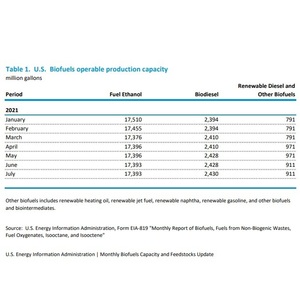EIA: US biofuel capacity, feedstock consumption expand in July

September 30, 2021
BY Erin Krueger
Operable biofuel production capacity in the U.S. expanded slightly in July, according to data released by the U.S. Energy Information Administration on Sept. 30. Biodiesel capacity was up, while capacity for ethanol and other biofuels held steady.
Total biofuel capacity was at 20.734 billion gallons in July, up from 20.732 billion gallons in June. Ethanol capacity was at 17.393 billion gallons in July, flat with June. Biodiesel capacity expanded to 2.43 billion gallons, up from 2.428 billion the previous month. Capacity for renewable diesel and other biofuels, including renewable heating oil, renewable jet fuel, renewable naphtha, renewable gasoline and other biofuels and biointermediates, was maintained at 911 million gallons.
Advertisement
The EIA estimates 26.886 billion pounds of feedstock went to biofuel production in July, up from an estimated 26.166 billion pounds in June.
According to the EIA, 25.096 billion pounds of corn and 32 million pounds of grain sorghum went to biofuel production in July, compared to 24.64 billion pounds and 36 million pounds, respectively, in June.
Biofuel producers also consumed 21 million pounds of poultry fat, 129 million pounds of beef tallow, 59 million pounds of white grease, 331 million pounds of yellow grease, and 4 million pounds of other waste oils, fats and greases in July, compared to 19 million pounds, 135 million pounds, 70 million pounds, 290 million pounds and 5 million pounds, respectively, in June.
Advertisement
Approximately 792 million pounds of soybean oil was consumed as biofuel feedstock in July, up from 663 million pounds in June. Biofuel producers also consumed 237 million pounds of corn oil in July, down from 241 million pounds in June. Approximately 123 million pounds of canola oil was used to produce biofuels in July, with the volume consumed in June withheld by the EIA to avoid disclosure of individual company data. An additional 62 million pounds of feedstock classified as “other” recycled feeds and wastes went to biofuel production in July, down from 67 million pounds the previous month. The EIA withheld July data for yard and food waste feedstocks, other vegetable oils, and “other” biofuel feedstocks to avoid disclosure of individual company data.
Related Stories
The USDA significantly increased its estimate for 2025-’26 soybean oil use in biofuel production in its latest World Agricultural Supply and Demand Estimates report, released July 11. The outlook for soybean production was revised down.
The U.S. Energy Information Administration maintained its forecast for 2025 and 2026 biodiesel, renewable diesel and sustainable aviation fuel (SAF) production in its latest Short-Term Energy Outlook, released July 8.
XCF Global Inc. on July 10 shared its strategic plan to invest close to $1 billion in developing a network of SAF production facilities, expanding its U.S. footprint, and advancing its international growth strategy.
U.S. fuel ethanol capacity fell slightly in April, while biodiesel and renewable diesel capacity held steady, according to data released by the U.S. EIA on June 30. Feedstock consumption was down when compared to the previous month.
XCF Global Inc. on July 8 provided a production update on its flagship New Rise Reno facility, underscoring that the plant has successfully produced SAF, renewable diesel, and renewable naphtha during its initial ramp-up.
Upcoming Events










